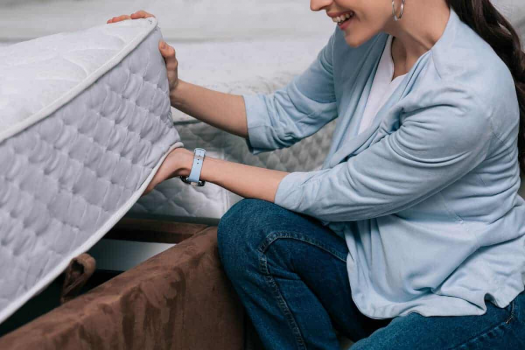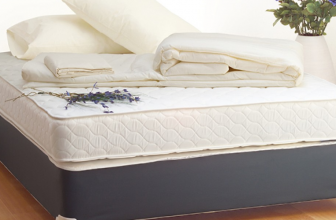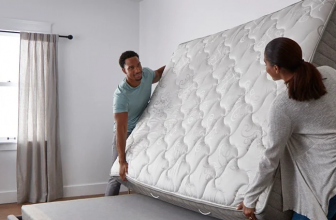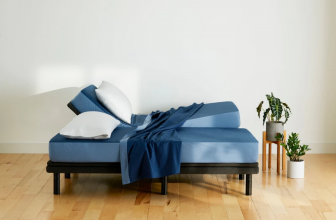Brief: Standard Mattress Thickness
- Overview: Standard mattress thickness ranges from 8 to 12 inches. Ideal thickness varies based on sleeping position and personal comfort needs.
- Benefits of Thick Mattresses:
- Better back and hip support, particularly for side sleepers.
- Increased comfort due to more cushioning.
- Greater durability and longer lifespan.
- Benefits of Thin Mattresses:
- Lighter weight, easier to move.
- Potentially cooler sleep experience.
- Suitable for stomach sleepers or those preferring a firmer surface.
- Mattress Thickness Chart: Provides a visual representation of different mattress thicknesses, from thin to thick.
- Factors Influencing Mattress Thickness:
- Mattress Type: Varies by construction (e.g., innerspring, memory foam, hybrid).
- Comfort Layer: Thickness of the top foam layer for comfort.
- Base Layer: Dense material providing foundational support.
- Considerations for Thickness:
- Sleeping Position: Side sleepers often need thicker mattresses for cushioning; stomach sleepers may prefer thinner mattresses.
- Body Type: Heavier individuals might require thicker mattresses for adequate support.
- Durability: Thicker mattresses tend to be more durable.
- Mattress Types and Thickness:
- Innerspring: 7-20 inches, varies by coil count.
- Air Mattress: Typically around 8 inches.
- Memory Foam: Generally 12-15 inches.
- Hybrid: Combines materials, thickness varies.
- Conclusion: Choosing the right mattress thickness depends on individual needs and preferences. Consider factors like sleeping position, body type, and desired level of support and comfort. Regular maintenance and proper support can extend the mattress’s lifespan and maintain its quality.
The thickness of a mattress is perhaps the most important aspect to consider when you purchase one. The proper thickness will give you the support your upper and lower back need while lying down and keep your spine aligned with proper posture.
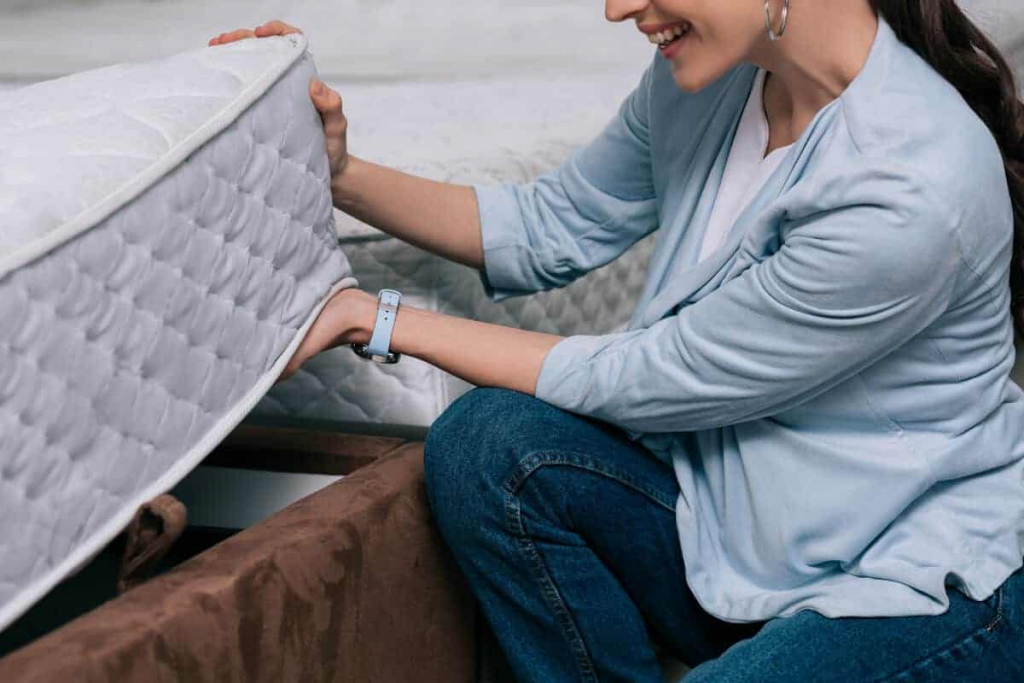
The standard mattress has 8 to 12-inch thickness. You should choose a bed depending on your sleeping position and other factors. For example, if you are a side sleeper or sleep on your stomach, it is essential to buy a thicker mattress because it will provide more support for the back and hips. Continue reading, and you’ll get all the necessary information about what to consider thinking on mattress thickness before purchasing.
Benefits Of Thick Mattress
Thicker mattresses are often more comfortable than lighter ones. They provide better support for all parts of the back, including hips, shoulders, and head.
Thick mattresses also offer more versatility to sleep on without restricting your body movement. To add a layer of comfort, consider adding a mattress topper or pillow top. A thick mattress tends to last longer than a thinner one.
Benefits Of Thin Mattress
There are several reasons why a thinner mattress is recommended. They are:
- You may feel hotter or colder than what you should be feeling.
- A thin mattress is usually lighter in weight and can be easily moved around.
This may also help with airflow and cooling when you sleep. You may be more likely to roll onto your side as well which is considered healthier than sleeping on your stomach (too much pressure on the hips).
Mattress Thickness Chart
Mattresses generally are made of foam, cotton, wool, latex, or other composite materials for comfort. They are divided into layers that determine their thickness as well as performance properties during your sleep.
Below, there’s a mattress thickness chart for consideration.
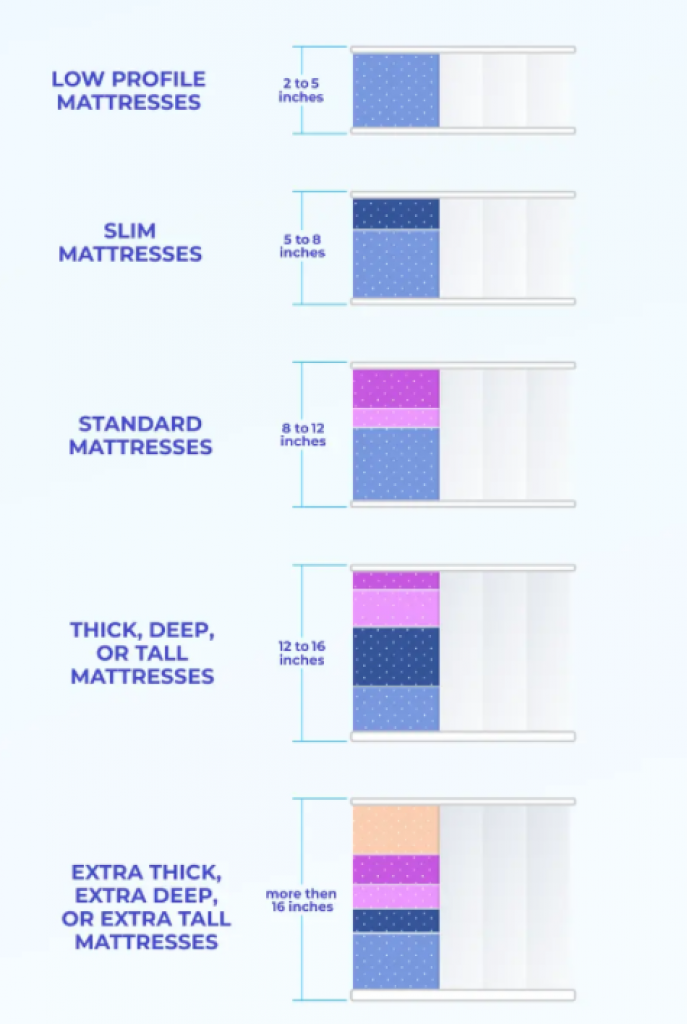
Factors Determining Mattress Thickness
Many factors determine the thickness of a mattress. The most important include the comfort layer, the type of material used in its construction, and the density of foam in the top and bottom layers.
Mattress Type
Not all mattresses are made the same way. They are built for different purposes, as well as levels of comfort, firmness, and support. Some beds are built to be thick, while others are recommended to be thinner.

Examples of some standard mattress types include:
- Innerspring Mattress. An innerspring mattress is one of the most popular types available on the market. It is made from coils and padding surrounding them. The thickness greatly depends on the number of coils used in its construction. Mattress measurements may vary among manufacturers, but as an average, innerspring mattresses fall between 7″ and 20″ thick.
- Air Mattress. An air mattress is made with thin vinyl that inflates to provide comfort while you sleep. There are no springs in an air mattress, which explains why it is very light and portable. It can give firm support to all parts of the back or even uneven areas of your body. The average air mattress will be about 8 inches thick.
- Memory Foam Mattress. Memory foam is a specialty type of mattress material, which is made from polyurethane foam. It is a memory foam type that adapts to the contours of your body, providing support and comfort for many hours without having to be replaced. Memory foam mattresses are generally pretty thick, measuring 12-15 inches.
- Hybrid mattress. A hybrid mattress type is a combination of two or more materials. This material type provides a good balance between comfort and support. The thicker it is, the better the body support from the mattress. An example of a hybrid would be innerspring over padding/memory foam construction with varying degrees of thickness.
Comfort Layer
The top layer of most mattresses is made of a thin foam layer to add comfort for the person sleeping on it. It is also used to absorb and disperse heat. The density of foam determines how thick the top layer of the pillow top or mattress topper should be.
Base Layer
The base layer in most mattresses is made of a dense material that supports the entire bed when compressed or expanded during your sleep. The thicknesses are usually about 2-4 inches, making it possible to move around without losing your balance or causing damage to your bed.
What To Consider When Deciding On Mattress Thickness
There are many important considerations when purchasing a mattress, including the above factors that determine its thickness. Your needs, budget, and sleeping position are primary factors to consider when choosing the right thickness for your bed. Depending on your sleeping position, you may need a thicker or thinner mattress than the one recommended above.

Sleeping Position
The different positions you choose to sleep in are:
- Side sleeper – The mattress should be at least 8 inches thick for side sleepers.
- Back sleeper – The mattress should be at least 15 inches thick for back sleepers.
- Stomach sleeper – A thin 8-10 inch mattress works fine for stomach sleepers.
Body Type
Your body type is another important aspect that determines your bed’s thickness. You should consider this a factor before buying a mattress since it will determine how much support the mattress should have to prevent back pain in the long run.
There are different types of body types:
- Thin people – If you are skinny with little muscle development, it is best to buy a thin mattress so you can enjoy a comfortable sleep without having your back and hips ache for many years.
- Normal people – Most people fall into this category, which means the thickness of your bed may not be as critical as other factors to consider.
- Heavy people – If you are overweight, it is best to buy a thicker bed for support and comfort as you sleep.
- Tall people – If you are tall, consider buying a thicker mattress than the recommended above for better support.
Mattress Durability
It is also very important to consider the durability of your mattress before making a purchase. A thicker mattress will be more durable since it will have more layers of material and fewer coils in its construction.
A bed with good durability will last many years before requiring replacement. With this in mind, the thickness of your mattress should depend on how long you intend to keep it before replacing it, as well as its purpose.
FAQ
What is a standard mattress thick?
A standard mattress is typically between 7 and 12 inches in thickness.
What does thickness mean for a mattress?
The thickness of a mattress is indicative of its comfort level, as more material is able to provide more cushioning.
What is the best thickness for a mattress?
This depends on personal preferences and sleeping habits, though a mattress between 10 and 12 inches is generally considered to be the best choice for comfort and support.
How thick are memory foam mattresses?
Memory foam mattresses usually range between 8 and 14 inches in thickness, though thinner varieties of 4 inches can also be found.
Are thicker mattresses better?
Not necessarily, as the best mattress will depend on personal preferences and sleeping habits. Generally, mattresses with more cushioning are more comfortable, but thicker mattresses may not provide enough support.
How thick are innerspring mattresses?
Innerspring mattresses usually range between 8 and 16 inches in thickness and often contain a mixture of foam layers and springs.
Can thicker mattresses cause back pain?
Yes, a mattress that is too thick for the user can cause back pain due to a lack of support and pressure point buildup.
Does the thickness of a mattress affect its lifespan?
Yes, thicker mattresses typically have a longer lifespan as they are able to support body weight better and resist sagging for a longer period of time.
How thick are latex mattresses?
Latex mattresses typically range between 8 and 10 inches in thickness and can be found in both firm and soft versions.
Is a thicker mattress better for back pain?
It depends on the individual, but usually, a mattress between 10 and 12 inches in thickness is the best choice for back pain sufferers.
Does mattress thickness affect the price?
Yes, thicker mattresses tend to be more expensive due to the higher quality materials and better support they provide.
Are thicker mattresses better for heavier people?
Generally, yes, as thicker mattresses provide better support and cushioning for heavier people.
How thick are hybrid mattresses?
Hybrid mattresses usually range between 10 and 16 inches in thickness and combine the comfort of foam layers with the support of innerspring coils.
Are thicker mattresses better for lighter people?
Not necessarily, as a mattress that is too thick can cause discomfort due to a lack of support.
Will a thicker mattress make a bed higher?
Yes, thicker mattresses will make a bed higher, as they increase the overall height of the bed.
You may want to revisit some parts of the article

